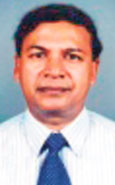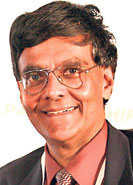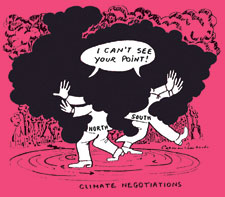The outcome of the Copenhagen Climate Summit is weak, says Prof. Mohan Munasinghe, Vice Chairman of the United Nations Intergovernmental Panel on Climate Change (IPCC). The delay in cutting down emissions of greenhouse gases such as carbon dioxide will increase the earth's temperature and bring intense catastrophic repercussions especially to developing countries like Sri Lanka, he says.
"It was expected that world leaders would reach agreement at Copenhagen to meet the projected emission cut targets. But the Copenhagen Accord is merely a political document without any legal force to ensure clear emission cuts. So I see the summit as a missed opportunity," a disappointed Prof. Munasinghe said.
Representatives of 193 countries went through two weeks of deliberations, working till last Saturday and burning the midnight oil on Friday in their bid to seal a meaningful climate deal.
Dr. W. L. Sumathipala, who led the Sri Lankan team at the talks, says the negotiations were indeed rigorous despite many international political twists at the summit. "Ultimately the Copenhagen Accord, prepared by a handful of leading countries, was presented.
But the accord only received the recognition of the assembly of 193 nations, not their approval. So the talks on emission cuts have been extended to 2010," says Dr. Sumathipala who heads the Climate Change Secretariat of the Ministry of Environment.
The biggest disappointment for Sri Lanka at the talks was the lack of commitment by rich nations to the Climate Adaptation Fund.
This fund was proposed as a mechanism to support developing countries to face the adverse effects of climate change such as the sea level rise, extreme weather patterns, intense droughts and outbreak of diseases. To meet these climate change challenges, experts say the fund should disburse at least US$ 200 billion a year to developing countries. Sri Lanka proposed that the rich countries should pay 1% of their GDP towards this fund because it believes that the industrialized countries which had emitted tons of carbon dioxide on their path to development were largely responsible for global warming.
"According to the polluter-pays principle, industrialized nations are bound to pay compensation. It is indeed a climate justice action," argues Dr. Sumathipala.
But what is offered for the Climate Adaptation Fund in Copenhagen for the short term period of 2010- 2013 is only US$ 10 billion. The rich countries agreed to increase the contribution to US$ 100 billion a year by 2020, but this offer came only as a late reply. "Together with other developing countries, we had raised Sri Lanka's concern at the conference to get enough funding for an effective Climate Adaptation Fund. But the final outcome has fallen short of our expectations," laments Dr. Sumathipala.
However, the biggest disagreement at the summit was over the emission cuts. The IPCC suggested an emission cut of 40% by 2020 to keep the earth's temperature rise at a manageable 2oC. But on this score, too, the summit failed to deliver.
 |
 |
| Dr. Sumathipala |
Prof. Munasinghe |
The maximum emission cut the European Union agreed was 20% of the baseline 1990 emission level. The United States, the biggest emitter, also pledged to make emission cuts, but it had taken the baseline of 2005 emission level. When compared to the United State’s 1990 emission levels, it will be only about 5% of emission cut that is pretty low.
"We are heading for a situation, where earth's temperature would rise by 3.5oC to 4oC and this could be very dangerous," warns Prof. Munasinghe.
Dr. Sumathipala says countries have been given time till January 31, 2010 to submit their pledges for curbing carbon emissions by 2020 and even emerging economies like China and India will be expected to be bound by their pledges.
But what is the position with regard to Sri Lanka?"Sri Lanka's emission levels are so low that experts do not think there will be any mandatory cuts that will be imposed on the country. When coal power plants begin operations, there will be a slight increase in Sri Lanka's Carbon Footprint — the amount of carbon dioxide produced by a country, but we will still remain a low emitter," assures Prof. Munasinghe.
Another negative trend that emerged at Copenhagen is the grouping of the industrialized nations together with emerging economies.
Despite the rigorous time-consuming negotiations, 24 influential countries including industrialized countries such as the United States and EU nations joined hands with emerging economies such as India and China to draft the Copenhagen Accord which was presented to the summit on the last day.
According to the Sri Lankan experts, this new grouping could undermine the voice of developing countries like Sri Lanka in future negotiations. "It turned out to be a non-democratic process and climate justice issues, including the equal emission rights for every human and accepting liability for damages caused by past emissions, were not recognized," Prof. Munasinghe says.
But there are pluses too according to the professor. "The Copenhagen Accord which is a weak document was kept open by the assembly, offering time until January 31 for countries to come up with aggressive mitigating targets. The other positive outcome is that all the countries accepted that climate change is happening beyond doubt and recognized the two degree danger limit for temperature rise.
Prof. Munasinghe also highlighted that Sri Lanka should be ready to take advantage of the Clean Development Mechanism (CDM) process where a country would earn foreign exchange. According to the CDM process, established under the previous agreement signed in Kyoto, countries could trade off their emissions by purchasing carbon credits (projects that cut carbon dioxide emissions). Sri Lanka established the National Carbon Fund in 2008 to gain these benefits, but we were late. So it is important to keep an eye on opportunities arising through the new rounds of climate negotiations early and act quickly.
The final lesson of Copenhagen Summit is that we cannot rely only on government leaders. Civil society and the business community can work in partnership to address the problem of climate change and push governments to take the right action.
"Without trying to address climate change by itself, we should try to make our overall development path more sustainable using the sustainomics framework which I first proposed at the Rio summit in 1992. Only then can we simultaneously tackle the issue of climate change and sustainable development," says Prof. Munasinghe. |



